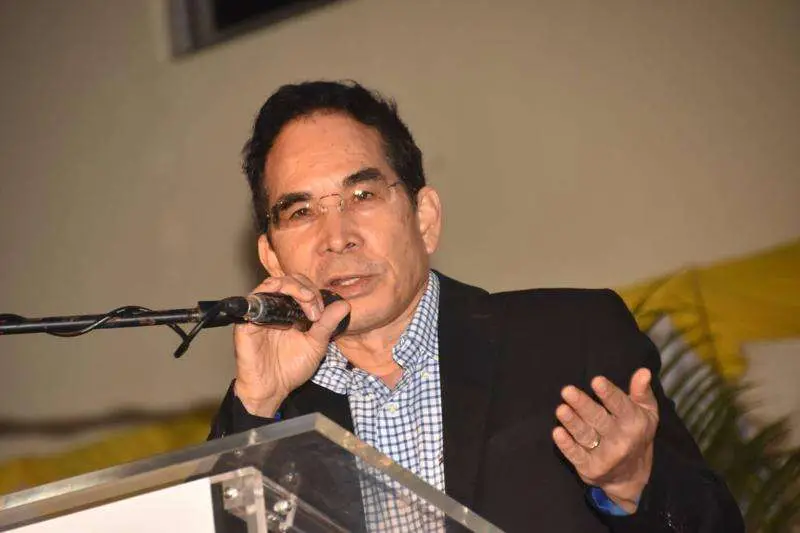
Why can’t Holness and Golding unite on crime?
In the 2016 election run-up Prime Minister Andrew Holness intimated that, if elected, Jamaicans could sleep with their windows open.
There were 1,208 murders in 2015, 1,463 in 2021 — a 10 per cent increase and a dismal failure. Word on the street is: Andrew doing alright, but crime out of hand.
Rachel Kleinfeld’s 2018 book A Savage Order: How the World’s Deadliest Countries Can Forge a Path to Security detailed how Colombia, Sicily, Georgia, and the Indian region of Bihar sharply cut murders.
Thomas Abt reviewed the book in Foreign Affairs magazine: “Kleinfeld shows how some countries have managed to cut crime and save lives. Others should learn from them… problem is not that governments are weak; it is that they are complicit… In Bangladesh, Jamaica, and Nigeria political parties hire criminal gangs to herd their voters to polls during elections and scare away opposition, then protect gangs between campaigns… To curb lethal violence, policymakers should focus their efforts specifically on such violence and abandon the false hope of addressing it indirectly via poverty, corruption, or other forms of crime. Basic improvements in security make every other strategy to improve social and economic welfare more likely to succeed.”
I e-mailed her about Jamaica.
“Ms Kleinfeld,
You mentioned my country Jamaica. Our murder rate is obscene. Yet Jamaica seems more politically stable than Colombia, Georgia, Sicily, [and] Bihar were. We have a free press, peacefully change leaders, rule of law mostly holds. (Though no politicians jailed since 1990.) We are not killing journalists or judges or political candidates. We don’t have guerrillas or paramilitaries or terrorists or bombings. Yet their murder rates fell dramatically. Ours remains world’s highest. Measures that should create a peaceful society seem present. But our murder rate is eight times global average. Why? I closed your excellent book scratching my head.”
Her response:
“Kevin,
I am no Jamaica expert. However, I would be surprised if its institutions were stronger than Sicily’s or Colombia’s — these were developed countries with strong institutions and free presses throughout their violent periods, just like Jamaica. The main issue was State use of violent groups, and then allowing those groups to continue. That has certainly happened in Jamaica. My case study countries also featured areas that did not see the State as fully legitimate because it provided unequally for different regions. Jamaica also has that.”
My response:
“Rachel,
Yes, Jamaica had serious political violence between 1972-1980, but not much now. Parties probably still ‘use gangs to herd voters to polls and then protect them between elections.’ But violence is a major factor in maybe 15 of 63 seats. You would expect a high murder rate, but not eight times world average and five times your 10 per 100,000 ‘endemic violence’ signpost.
Compared to Sicily and Colombia in your book, Jamaica has not killed a journalist or judge or political candidate for 30 years. Kidnappings are rare. Politicians and businessmen hardly have bodyguards. And we regularly boot governments peacefully.
I read your book feeling Colombia, Sicily, Georgia, Bihar climbed 20-foot walls, while Jamaica can’t scale a two-foot fence.
Her response:
“Kevin,
You ask important questions. I believe gangs and political parties still have connections, but, again, I am not a Jamaica expert. In every country I studied, the problem is not that violent groups are controlled by political parties. It’s that parties protect them and provide impunity for non-political crimes. Criminal violence increases with impunity as gangs engage in tit for tat. Politicians gain nothing from endemic violence. But they can’t stop it without arresting their own gangs or cracking down broadly on violence.
Criminals also seek legitimacy from people governments left behind. So the Government’s role in causing violence is not only protecting criminal groups, it is also abandoning some areas to such poverty and lack of social services that criminals can step in and provide food, subsidised housing, medical services, and other needs not provided by Government. That clearly happened in Tivoli with ‘Dudus’ [Christopher Coke], and his real social support protected him even when the Government was forced to act against him. This may be a shared fault between the Government and a society that votes to keep taxes too low to cover the needs of all citizens. Altering this is politically complex.
The final stage of privilege violence is that, once impunity levels are high, violence becomes normal within affected communities. (Violence in every country is concentrated. In Bogota 99 per cent of homicide occurs on 1.2 per cent of streets). Violence is also least prosecuted where it is most concentrated. Police are often underfunded and then concentrated not where crime is highest but where wealthy need protection: tourist and business districts. In all countries I researched, police assumed violence in high-violence areas was mostly directed at other criminals, so investigations were lax.
However, once violence is normal and repercussions non-existent, regular people resort to violence far more frequently. This could be psychological — I speculate about PTSD [post-traumatic stress disorder] and even epigenetic changes that lower impulse control in some people raised around violence. Low levels of policing might also lead people to take justice into their own hands. Domestic violence, fights between neighbours, bar fights, all lead to more murders. So once violence is entrenched, as it is in Jamaica, the professional criminals may make up a majority but are hardly the only cause, and a significant plurality, much higher than in other countries, drags the tail of regular violence.
Violence among regular people subsides slowly because there is no single cause. It requires normative change — recivilisation. That requires Government to lower the impunity rate and enforce rules so people don’t feel a need for jungle justice, and violence becomes less normalised.
What starts with the State ends in society, and it takes both the State and society to get themselves out of the muck.
A four-point plan:
1) Process must start with politicians ending protection for violent gangs who may deliver votes.
2) State must reduce police brutality, another way violent gangs ingratiate themselves.
3) State must provide enough public services for all citizens so violent groups can no longer gain legitimacy by offering services where the State is absent.
4) State must enforce laws equally everywhere and not allow some areas to effectively go without law enforcement.
By doing these things governments can tackle the portion of violence rooted within regular society.”
Prime Minister Holness recently discussed creating a space where the treatment of violence is not contested politically by Government and Opposition. Has he forgotten promises made at the October 2019 Stakeholders Summit on Crime?
According to the Private Sector Organisation of Jamaica’s press release on the crime summit, “Both the prime minister and the leader of the opposition agreed to publicly repudiate any connection between politics and gang violence and would walk together in violence-affected communities.”
In his 2011 inauguration speech Prime Minister Holness proclaimed: “Both political parties have it within them to mutually agree to end the social construct of the garrison… Let us start the process by getting the leaders to walk together in these areas of exclusion… Hopefully, this small step will lead to other steps that will eventually eliminate garrisons.” 82 per cent of Jamaicans agreed.
At the recent funeral for the tragically murdered family of five, Opposition Leader Mark Golding pledged: “Prime Minister, you have my support on all measures to turn this country around to a better place. Unity is strength.”
During the Emancipation Day street parade, Holness and Golding shook hands and freed peace doves. Why can’t they show unity on the ground in violence-prone communities, where it can truly make a difference?

kob.chang@fontanapharmacy.com
























